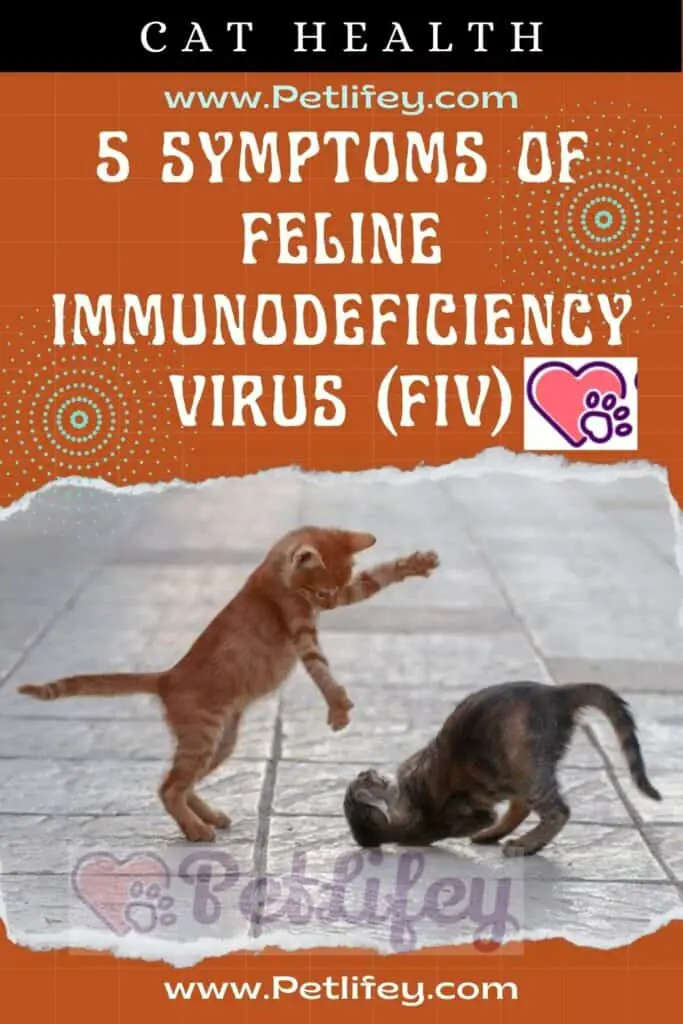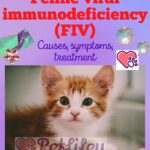
The FIV or feline immunodeficiency virus (FIV) is, along with feline leukaemia, one of the most frequent diseases in cats.
The difference with respect to leukaemia is that FIV is a virus classified within the group of lent viruses or in other words, it is a slow virus that affects the immune system of cats for a long period of time.
The virus, immune cats and its effects
It is a disease that only affects cats, which means that neither people nor other animals can be infected by this virus.
The problem with this disease is that it favours the manifestation of secondary infections and, curiously, these infections are the main cause of death among cats infected with FIV or also known as cat AIDS.
In the event that a cat becomes infected, three different situations can occur:
● First, that the cat manages to defeat the virus and becomes immune to it.
● Second, that he becomes a carrier but does not suffer from the disease.
● Third, that the animal continues its life without any symptoms but with the disadvantage of a compromised immune system.
Is feline immunodeficiency spread?
It is convenient that they do not share the feeders, basically, due to the issue of saliva, which could be a very remote route of infection.
The only possible way of contagion of this virus is through a deep bite of an infected animal to another healthy one and, also, through blood transfusions.
And, as we discussed earlier, it cannot be transmitted to humans or other animals either. So if we have several cats living together and they get along, there is no problem of any kind; there is a greater risk when the cat carrying the virus is an aggressive cat.
Non-aggressive contact between cats that share the same home does not appear to be a route of infection.
Much less frequent is the transmission from mothers to children. There is only a possibility of contagion in the case of FIV positive mothers who are in the acute phase of infection during pregnancy and contagion occurs through breast milk or by ingestion of blood at the time of delivery.
But we repeat that they are isolated cases, since the kittens in the uterus are protected by the placenta that surrounds them and, once they are born, the mucous membrane protects them from transmission.
5 symptoms of immunodeficiency in cats
FIV infection in cats generates a slow process, in which they go through different stages, similar to that suffered by humans infected with AIDS. In feline immunodeficiency with symptoms we see:
1. In a first or acute phase, fever, neutropenia (number of neutrophils in the blood too low) and lymphadenopathy (inflammation of the lymphatic glands) can be observed. Diarrhea and mild respiratory symptoms may occur. The mortality rate is low and, although there is recovery in this phase, all cats become carriers of the infection. This phase lasts approximately between 4 and 16 weeks.
2. In the second phase or also known as the asymptomatic carrier phase, the virus in the blood can be isolated and cats show alterations in the immune system. Under natural conditions we could not indicate with certainty the duration of this phase, but in the case of experimental studies it has been shown that it can last up to 4 years.
3. In the third phase or phase of lymphadenopathy, recurrent fever, lymphadenopathy, leukopenia (decreased number of leukocytes in the blood), anorexia, anemia, weight loss, and behavioural disturbances occur. This phase is relatively short, lasting only a few months.
4. In the fourth phase, symptoms such as chronic secondary infections, chronic diarrhea, blood or haematological abnormalities, thinning, stomatitis or inflammation of the oral mucosa, as well as the gums and periodontal tissues, may occur. This phase usually lasts for months to years and the felines that survive it reach a state similar to AIDS in humans.
5. In the fifth or terminal phase, there may be “opportunistic” infections (infections that take advantage of a weakened immune system), extreme thinness, anemia, or leukopenia. Eye disorders, neurological disorders, character changes, mental deterioration, psychotic behaviours, and nervous tics can also be seen. Most cats in this phase usually die within 1 to 6 months.
Other symptoms that we could mention would be:
● Dull or depleted coat
● Recurrent skin infections
● Abortion and reproductive problems in infected fertile cats.
The veterinarian will carry out an examination and will take into account the symptoms that our pet presents in order to carry out a diagnosis, but to be able to verify if the animal is infected by the feline immunodeficiency virus, it will have to perform several techniques to detect antibodies to the VIF.
Such tests can be performed at the veterinary clinic, but since they are sometimes not 100% reliable, more complex tests can be used in a laboratory. Tests such as western blot, the PCR technique and radioimmunoprecipitation are carried out. Currently, there is an immunochromatogenic test that can detect both feline leukaemia antigen and feline immunodeficiency antibodies at the same time.
Treatment for feline immunodeficiency

The most important treatment for feline immunodeficiency is prevention. The cat must be protected and prevented from being exposed to any type of infectious agent that could cause serious illness or even death, since it is an animal with a weakened immune system.
To prevent your cat from being infected, it is best not to leave the house and, in the event that it is already infected, it is the only way that it does not infect other animals and prevent any virus or bacteria from endangering life of your cat.
There could be a vaccine that would help prevent FIV infection, but it is only tested in the US, Japan or Australia, on inactive viruses and with inconclusive results.
If your cat is infected, you must strengthen its immune system and, consequently, its defences. There are antimicrobial drugs that can prevent the attack of bacteria and future infections to the animal.
Also with regard to some of the symptoms that manifest as stomatitis and gingivitis, there are anti-inflammatories and, if you have a fever, you can be given antipyretics.
Apart from the supply of drugs to our pet, the diet of cats with feline immunodeficiency must be special.
It is recommended that they follow a diet that is high in calories and protein. Another essential factor is not to forget about deworming, for which it would be convenient to have a vaccination schedule, since any host that settles in your cat could kill it. Whether your cat is male or female, spaying or neutering is recommended.
In this way it is avoided that in the periods of heat they leave home and look for problems with other stray cats.
In the case that it is female and positive for FIV, possible infections in pregnancy or lactation are thus avoided. As the owner, you are responsible for the health of your cat, so you have to be constant in these preventive care if you want to give it a decent life.
Any new cat arriving at the family home will need to be examined by a veterinarian and kept isolated from other animals for several weeks of quarantine. During this period of time, they should be tested for FIV, to rule out any type of contagion with other pets.
There is an antiviral called interferon, which has been tested in trials and improves the symptoms of the virus.
Although at the moment there is no cure for this disease or any treatment that acts directly on the FIV virus, with proper care your cat can enjoy a good quality of life.
This article is informative, without the power to recommend any veterinary treatment, so we suggest that in the event of any unusual symptoms, you consult your veterinarian.






